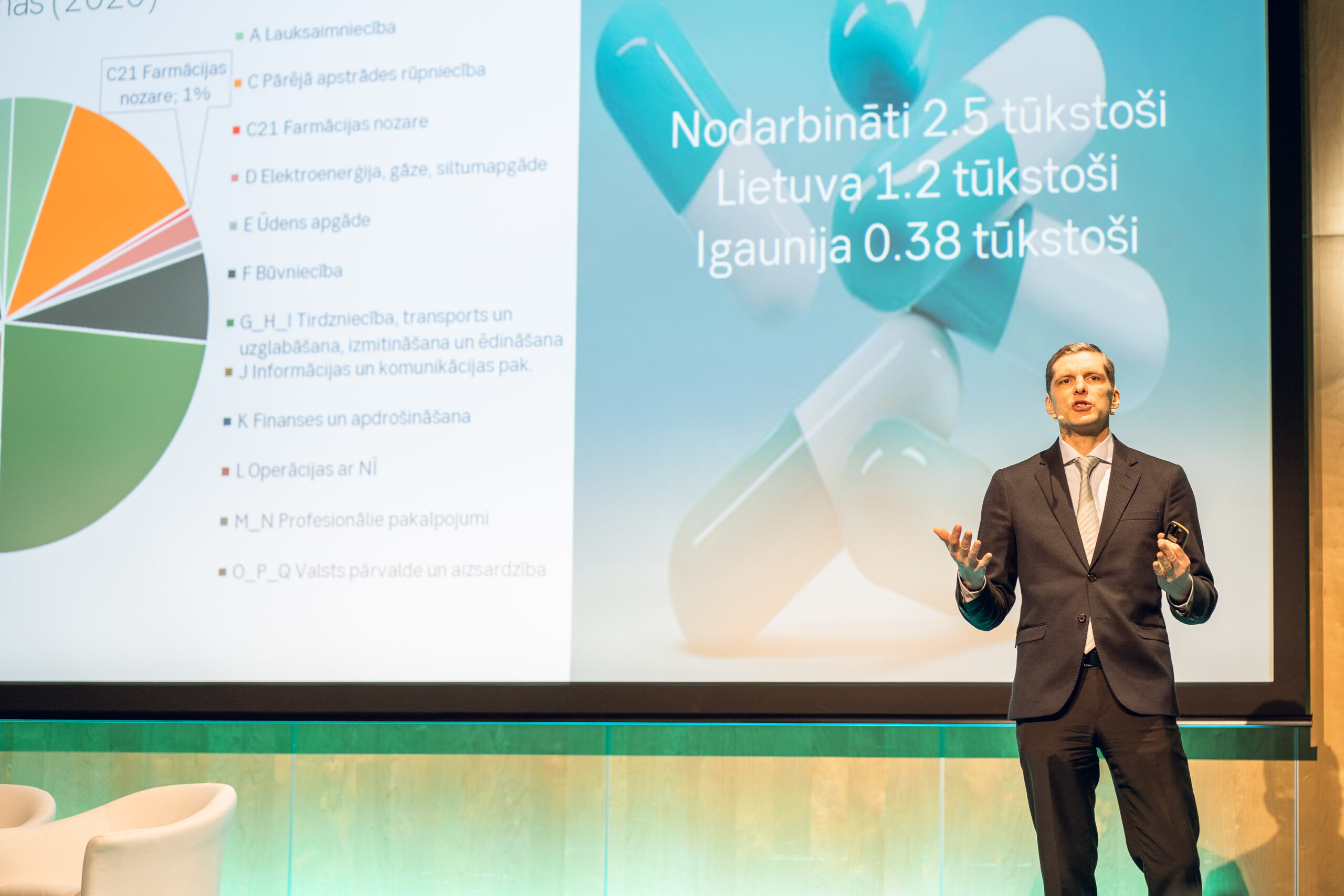We can achieve so much in sports and in science simply because we don’t know that we cannot. This is what Dr. rer. pol. Arnis Sauka, the professor of Stockholm School of Economics in Riga and the Chairman of the Council of Vidzeme University of Applied Sciences, concluded at the AS Olainfarm conference. Indeed, Latvia has huge potential in various industries, including pharmaceuticals, but it is not fully exploited.
“The pharmaceutical sector has one of the greatest potentials to develop the country’s economy as a high value-added sector with high export potential. In pharmaceutical exports, Latvia ranks among the world’s major countries, coming in at 38th place, which is very good. In Latvia, the sector employs 2,500 people, while in Lithuania and Estonia it employs only 1,2 and 0,38 thousand people respectively. At the same time, the sector faces the same challenges as any other sector: geopolitical shocks, supply chain disruptions, high inflation and base interest rates, while not only companies, but also regions and even countries compete for workforce with the specific skills needed for the sector. Therefore, public support for the development of the pharmaceutical industry should be much stronger, as the potential could also be greater than at present. It is important for Latvia to develop its strengths in pharmaceuticals and to find its niche in exports, so that we can use the funds to buy what we need but cannot produce ourselves,” Dainis Gašpuitis, economist at SEB Bank, emphasised at the conference.
The President of the Latvian Academy of Sciences, Prof. Dr. Ivars Kalviņš, also points out that science currently lacks the necessary infrastructure and sufficient investment to develop the field of innovation more rapidly.
“If Latvia wants to produce high value-added products, it needs to be aware that innovation is at the root of the production of such products, but this is ensured by a number of factors – education, science, technological development and innovative entrepreneurship. For the pharmaceutical sector to contribute successfully to a country’s economic development, it needs not only finance, but also targeted research, technological development and innovation. Compared to 2015, Latvia’s innovation system grew by only 4.7 percentage points, well behind our neighbours Lithuania (19.9) and Estonia (24.4), not to mention the rest of Europe. Unfortunately, in Latvia the infrastructure for knowledge and technology transfer no longer exists in either the public or the commercial sector – we do not have access to design offices, electronics and fine-mechanics pilot workshops, modern pilot batch production facilities, standardisation laboratories and certification centres. Since only a few private companies can maintain their own research centres, public sector research institutions should become the engine of innovation in Latvia and, with the support of the state and local governments, create the necessary infrastructure and ecosystem for innovation that is also accessible to the commercial sector,” said Ivars Kalviņš.
Diversification and new companies cannot emerge without adequate state support, but this also means that the sector cannot contribute as quickly and strongly to the overall economic growth of a country as it would if its full potential were exploited, says Dr. chem. Osvalds Pugovičs.
As Ieva Siliņa, Advisor to the Minister of Economy on Innovation and Digitalisation, pointed out during the conference discussion, the state has now established an Innovation Fund with operating principles that provide for much faster access to funding in order to eliminate the previous “project-science-end of project-drawer” principle and ensure continuity of ongoing research. Support programmes for companies, including the pharmaceutical sector, are also available at the Investment and Development Agency of Latvia and the state development finance institution ALTUM.
Meanwhile, Olainfarm plans to invest €100 million over the next five years in modernising production and developing new products as it continues to expand production and focus on western markets. The company aims to become one of the 10 most important pharmaceutical companies in Europe in the next five years, increasing production 2-2.5 times. At the same time, the company points out that much stronger cooperation is needed with decision-makers, industry partners, scientists and the public.
“Only together can we do something, instead of each pulling the rug in his own direction because there won’t be enough money for everything. We all need to understand together what our priorities are and work towards them. The Latvian pharmaceutical industry is one of the key players in strengthening national security – we must be ready to provide the necessary healthcare and medicines to the population under any circumstances, even at the x hour,” said Juris Bundulis, Chairman of the Board of Olainfarm AS, at the end of the conference.
